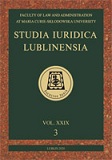Discretionary Power of Public Administration and Control of Public Debt: The Citizen and the Judge between the Law and the Precedent
Discretionary Power of Public Administration and Control of Public Debt: The Citizen and the Judge between the Law and the Precedent
Author(s): Giovanni PesceSubject(s): Law, Constitution, Jurisprudence, Public Administration, Public Finances, Court case
Published by: Wydawnictwo Naukowe Uniwersytetu Marii Curie-Sklodowskiej
Keywords: public debt; citizen; public administration; discretionary power; judicial control;
Summary/Abstract: Discretionary power, a central feature of administrative power, comes into play when administration is called to select an option between two or more solution and a way of balancing between public and private interests. After the 20th century, devastated by wars, public deficit and debt, most State models circumscribed their markets to the detriment of the global one, turning the old economic models into new ones after the 1958 Treaty of Rome and, after the phase following the Maastricht Treaty of 1992, and the crisis of 2008, the final concept is that the EU Members States should restructure the public finances, facing the increase of the public goods and services demand and with the rested rights. The purpose of this article was to enquire whether the European and national rules may limit the discretionary power while expanding the administrative one.
Journal: Studia Iuridica Lublinensia
- Issue Year: 29/2020
- Issue No: 3
- Page Range: 117-134
- Page Count: 18
- Language: English

